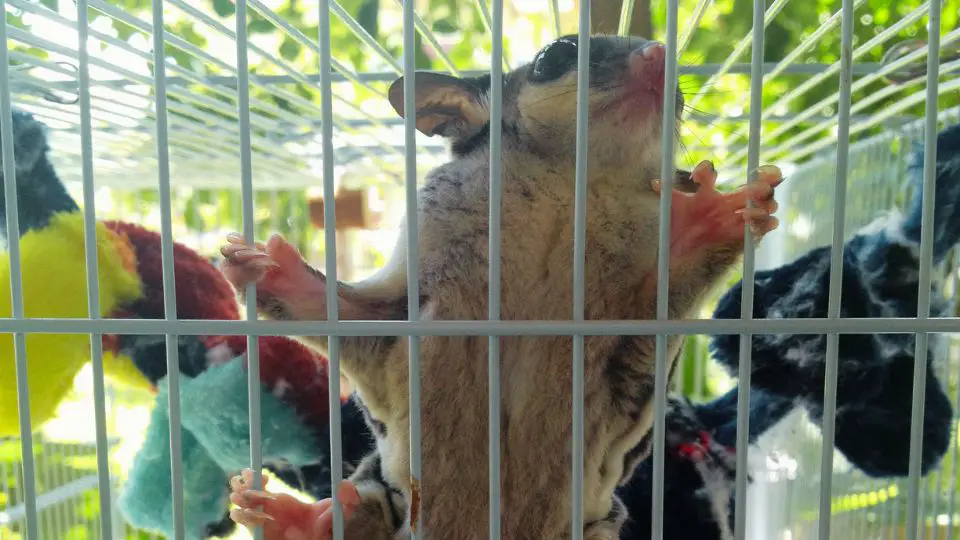Sugar gliders are known for their cute little bark. But why do they bark? What are they trying to say? Sugar gliders bark for a variety of reasons. They may be trying to communicate something specific, or they may just be excited.
However, sugar glider owners should be aware that barking can be a sign of distress. If your sugar glider is barking excessively, it’s important to take him to the vet to rule out any medical problems.
In this post, we’ll take a look at the reasons sugar gliders bark and what it means for their owners.
Why do sugar gliders bark
Sugar gliders are sensitive creatures and may bark for a variety of reasons. They may be seeking attention, letting their owner know that they are sick, or simply barking for no apparent reason at all.
They’re disturbed or shocked
Just like dogs, gliders bark when they experience something surprised or shocking to them. Common causes why gliders bark are hearing the voice of some visitors, breaking glass, and even loud television.
When this happens, take a close look at your glider and see if it’s really in distress or just trying to tell you that something’s going on. If your glider is truly uncomfortable, then you might want to remove the source of the noise.
They’re hungry
Since sugar gliders are nocturnal animals, they sleep during the day and are awake at night. This means that they may want to eat at night, and may bark to let you know that they’re hungry.
If your gliders are consistently barking at night, try putting a bowl of food near their cage so they can snacks on something if they get hungry.
They’re sick or lonely
Sugar gliders are social creatures and do not like to be alone. If your sugar glider is barking, it may be because it’s lonely and wants some attention. Try spending some time with your glider every day, even if it’s just for a few minutes.
If your sugar glider is still barking, it may be sick. Take your glider to the vet to make sure everything is okay.
They want attention
Sugar gliders are attention seekers and may bark to get your attention. If you think this is the reason why your sugar glider is barking, try giving it some attention when it’s quiet. This may include playing with it, petting it, or even just talking to it.
No reason at all
If your glider has been barking excessively for no apparent reason, it’s important to get a veterinarian’s opinion to determine if your pet is suffering from a medical condition.
How to stop the Sugar Gliders barking
Sugar gliders are interesting creatures that can make great pets. But like any pet, they come with their own set of challenges. One of those challenges is dealing with the noise they make, particularly at night. If you’re looking for ways to stop sugar glider barking, here are a few tips to help you out.
Understand the reasons of the barking
The first step in stopping the sugar gliders from barking is to understand the reasons why they are barking. Sugar gliders are nocturnal creatures and tend to make noise and bark during the night. If possible, keep the cage away from your bedroom and make sure that it is fully-proof so that your pet cannot get out.
Moreover, bear in mind that sugar gliders’ barking may be triggered by changes in their mood, so you need to understand the mood of your pets before you can try to stop the noise.
In most cases, it’s simply because they’re bored or stressed. If your sugar glider is bored, try providing them with more toys and playtime. If they’re stressed, try to create a more relaxed environment for them.
Leave them food
Another way to stop the sugar gliders from barking is to feed them regularly. Sugar gliders are nocturnal animals and may want to eat during the night. If your gliders are consistently barking at night, try putting a bowl of food near their cage, so they can snacks on something if they get hungry.
Training
You can try to train your sugar glider to be quiet. This will take patience and consistency, but it can be done. Start by rewarding your sugar glider when they’re quiet.
For example, you can give them a treat or extra playtime. Then, gradually increase the amount of time they have to be quiet before they get a reward.
Consult a vet
If all else fails, you can always consult with a veterinarian. They may be able to prescribe medication to help your sugar glider calm down.
Keep them in another room
If nothing seems to work, try leaving them in a different room for the night. This will at least allow you to get some sleep.
Are sugar gliders noisy at night?
Sugar gliders are nocturnal animals, which means they are active at night and sleep during the day. Because of this, they are often considered noisy animals. If you keep your glider’s cage near where you sleep, you may notice the barking and other noises they make during the night.
This might wake you up, or it might not, depending on how heavy of a sleeper you are. Sugar gliders are social animals, so they may also make noises to communicate with their cage mates.
However, you can train your sugar glider to be quiet if the noise is bothersome to you. With patience and consistency, you can teach your sugar glider to stop barking at night.
Some of the reasons why the sugar gliders are noisy at night include boredom, stress, or fear. Others may simply be communicating with you. Whatever the cause, be sure to feed them, keep them in a warm place, and provide plenty of entertainment. If you notice any of these signs, seek help from a veterinarian. Listed below are some other reasons that your glider might be barking at night.
Why do sugar gliders make weird noises?
Sugar gliders make many strange noises. Some of them may seem like gurgling sounds, while others may be singing. Both are related to the sounds they make while feeding. The singing noises may be intended to express their love for their offspring, or they may be trying to shift the joey into a better position. Gliders may make chirps or whistling noises while eating, but the actual purpose of the noises isn’t entirely clear.
One of the most common sounds sugar gliders make is a purring noise. This noise is a happy sound that accompanies a playful mood. A chitter-chattering noise may indicate excitement or affection. In the latter case, the noise is a sign that your glider is happy or content.
If this noise is coming from its nasal cavity, it may be a sign of a threat or stress.
Do sugar gliders bark while sleeping?
Sugar gliders may bark while sleeping, usually because they feel scared by something. It is important to rule out any medical causes for the barking before trying to stop it. Generally, you don’t have any reason to be concerned if your sugar glider is barking while sleeping.
Should You Worry If Sugar Glider Doesn’t Bark?
If your sugar glider isn’t barking, it doesn’t necessarily mean something is wrong. Sugar gliders are known to be quiet animals, so if your sugar glider isn’t making any noise, it could just mean they’re content and don’t have anything to say.
Of course, if you’re ever concerned about your sugar glider’s health, always consult with a vet. But in general, a sugar glider not barking isn’t cause for alarm. So if your sugar glider is being quiet, take it as a sign of a happy and healthy pet!
Conclusion
Sugar gliders are nocturnal animals, so they are often considered noisy. If you keep your glider’s cage near where you sleep, you may notice the barking and other noises they make during the night.
However, you can train your sugar glider to be quiet if the noise is bothersome to you. With patience and consistency, you can teach your sugar glider to stop barking at night. Some of the reasons why the sugar gliders are noisy at night include boredom, stress, or fear. Others may simply be communicating with you.
Whatever the cause, be sure to feed them, keep them in a warm place, and provide plenty of entertainment.







